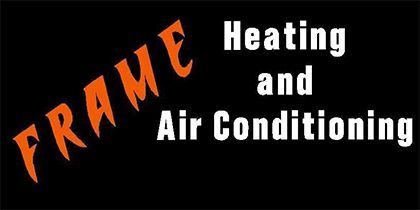FAQs
Frame Heating and Air Conditioning
Have an HVAC services-related question? Frame Heating and Air Conditioning has the answer. Check out these FAQs and give us a call today for more information!
What is HVAC, and why is it important?
HVAC is an acronym for heating, ventilation, and air conditioning. These systems regulate temperature, humidity, and air quality in buildings. Proper HVAC maintenance is crucial for ensuring comfort, energy efficiency, and optimal air quality in your home or business.How do I know if my HVAC system needs repair?
Several indicators suggest your HVAC system may require repair. These include unusual noises, reduced airflow, uneven temperatures, higher energy bills, or system failure. If you notice any of these signs, it's advisable to have a professional inspect your system promptly.How often should I have my HVAC system serviced?
We recommend servicing your HVAC system annually. For heating systems, schedule maintenance in autumn before cold weather arrives. For cooling systems, arrange a check-up in spring before summer heat begins.How can I improve the energy efficiency of my HVAC system?
To enhance your HVAC system's energy efficiency, consider these steps: change air filters regularly, seal air leaks around windows and doors, install programmable thermostats, and schedule routine system maintenance.What should I do if my HVAC system isn't cooling or heating properly?
If your HVAC system isn't functioning correctly, first verify your thermostat settings and power supply. Next, inspect your air filters and replace if necessary. If problems persist, contact an HVAC professional for a thorough inspection, as the issue could be related to refrigerant leaks, electrical problems, or other system malfunctions.How long does an HVAC system last?
The lifespan of an HVAC system typically ranges from 10 to 20 years, depending on the system type and maintenance quality. Regular upkeep can significantly extend your HVAC system's operational life.What is indoor air quality, and how can I improve it?
Indoor air quality (IAQ) refers to the air condition within a building and its impact on occupants' health and comfort. To enhance IAQ, consider using air purifiers, replacing air filters frequently, ensuring proper ventilation, and managing humidity levels.What is a SEER rating, and why is it important?
SEER, or seasonal energy efficiency ratio, measures an air conditioning unit's efficiency. A higher SEER rating indicates greater energy efficiency. Opting for a system with a higher SEER rating can lead to long-term savings on energy costs.Can I extend the life of my HVAC system with regular maintenance?
Indeed, regular maintenance can significantly prolong your HVAC system's lifespan and improve its performance. This includes cleaning coils, checking refrigerant levels, and inspecting various system components.Are HVAC systems covered by a warranty?
Most HVAC systems come with a manufacturer's warranty covering parts and labor for a specified period, typically 10 years for parts and 1 year for labor. It's important to register your system post-installation to activate the warranty.


Share On: